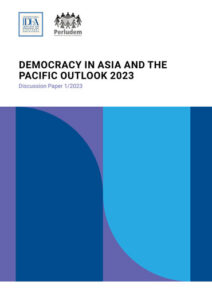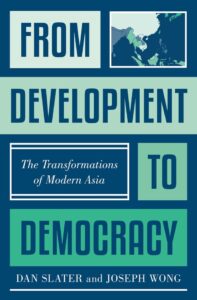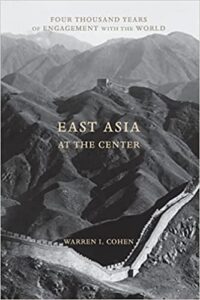Democracy generates economic dividends by aligning incentives and spontaneous solutions. That at least was the assertion of the Myanmar Economic Resilience and Reform Plan (MERRP), which the National League for Democracy government was poised to implement shortly before the 2021 military coup, said Professor Sean Turnell, a former Special Economic Consultant to the Myanmar State Counsellor.
In short, democracy comprises both the ends of policy and the vehicle for its implementation, he told this week’s Sunnylands Initiative forum (above), hosted by the United States Studies Centre and the National Endowment for Democracy (NED).
 “The protection of democratic norms and universal values provides a foundation for the security of all Indo-Pacific nations,” said NED President and CEO Damon Wilson. “Dialogue between our nations’ independent civil societies on equal footing is a key step in establishing where the challenges and opportunities for partnership lie, making this third Sunnylands Initiative a catalyst for action and democratic partnership.”
“The protection of democratic norms and universal values provides a foundation for the security of all Indo-Pacific nations,” said NED President and CEO Damon Wilson. “Dialogue between our nations’ independent civil societies on equal footing is a key step in establishing where the challenges and opportunities for partnership lie, making this third Sunnylands Initiative a catalyst for action and democratic partnership.”
The panel was moderated by USSC CEO Dr. Michael Green, and speakers included Ambassador Yukio Takasu, chair of Future of Democracy Study Project and Former Permanent Representative of Japan to the United Nations; Dr. Sook Jong Lee of Sungkyunkwan University; and Dr. Henry Ivarature of Australian National University.
The U.S. and Australia “both on their own and as allies, are indispensable bedrocks for supporting democratic governance with partners and allies in the region,” said Dr. Green, “But we cannot do it alone. We need to respectfully listen to neighbors in our region, engage in dialogue, and work together to find solutions to the challenges we face.”
 In “From Development to Democracy: The Transformations of Modern Asia,” Dan Slater and Joseph Wong seek to explain why democracy emerged in some countries, has been tried in others and is unlikely to take root in China, notes the University of Maryland’s Warren I. Cohen, author of “East Asia at the Center.” They argue persuasively that some regimes are capable of moving from authoritarian forms of government to democracy, he writes for The Post:
In “From Development to Democracy: The Transformations of Modern Asia,” Dan Slater and Joseph Wong seek to explain why democracy emerged in some countries, has been tried in others and is unlikely to take root in China, notes the University of Maryland’s Warren I. Cohen, author of “East Asia at the Center.” They argue persuasively that some regimes are capable of moving from authoritarian forms of government to democracy, he writes for The Post:
In Japan, Taiwan and South Korea, strong institutions were built to help ensure that neither national stability nor the interests of the political elite would be threatened by free and fair elections. At the apex of their power, leaders in these countries recognized signals of incipient decline and concluded that democratic reforms would allow them to keep, and perhaps even increase, their power.
A few comparative political theorists have advocated for a combination of Confucianism and democratic thought as a viable alternative to liberal democracy, says Berggruen Institute fellow Inho Choi. In particular, Sungmoon Kim of the City University of Hong Kong has advocated what he calls “public reason Confucian democracy,” which is based on actual democratic practices in South Korea. Even supposedly Western democratic principles, Kim argues, can be enhanced by using the resources of Chinese civilization, he writes for Noema:
 Kim argues that unlike in many post-communist societies where civic activism subsided after institutional democratization was achieved, Korean civil society drew from its Confucian legacies to build a thriving ethical civil society during its period of democratic consolidation. Inspired by the Neo-Confucian ideal of moral agents who have an active duty to rectify the wrongs of public institutions, Korea’s ethical civil society has functioned as a government evaluator and acted to remove unfit rulers when their corruption decidedly compromised the legitimacy of the state and sovereignty of the people, like the 2016-17 candlelight protests that led to then-President Park Geun-hye stepping down.
Kim argues that unlike in many post-communist societies where civic activism subsided after institutional democratization was achieved, Korean civil society drew from its Confucian legacies to build a thriving ethical civil society during its period of democratic consolidation. Inspired by the Neo-Confucian ideal of moral agents who have an active duty to rectify the wrongs of public institutions, Korea’s ethical civil society has functioned as a government evaluator and acted to remove unfit rulers when their corruption decidedly compromised the legitimacy of the state and sovereignty of the people, like the 2016-17 candlelight protests that led to then-President Park Geun-hye stepping down.
South Korea is a key U.S. ally and a democracy, proving that Confucian-inflected democratic governance is not necessarily antithetical to the West, Choi suggests.
Overwhelming number of police, prison guards and business leaders hate the Myanmar regime says @SeanTurnell. Change will come from internal dynamics. #Sunnylands pic.twitter.com/MO1B4Wcnz6
— Damon M. Wilson (@DamonMacWilson) April 4, 2023







